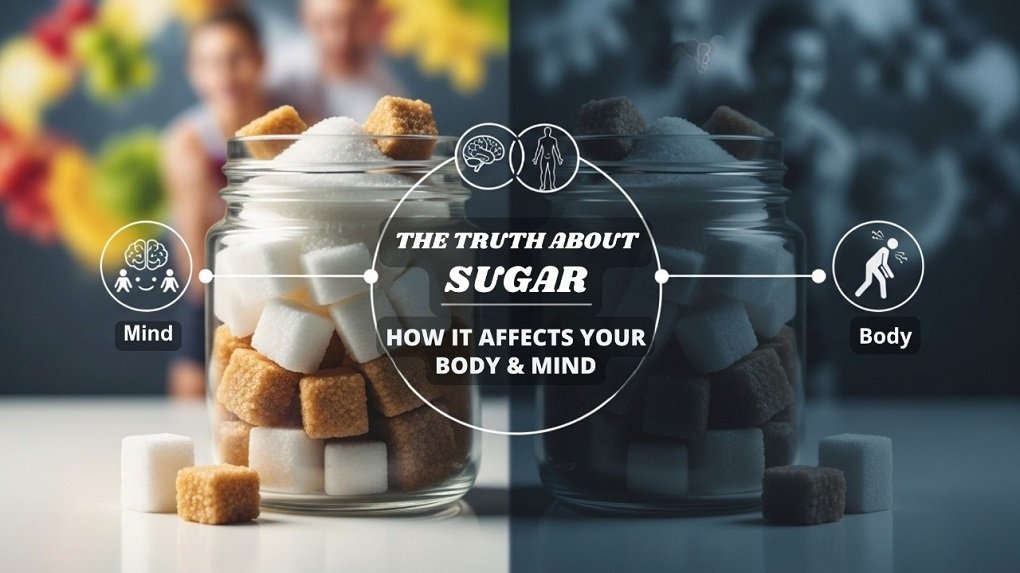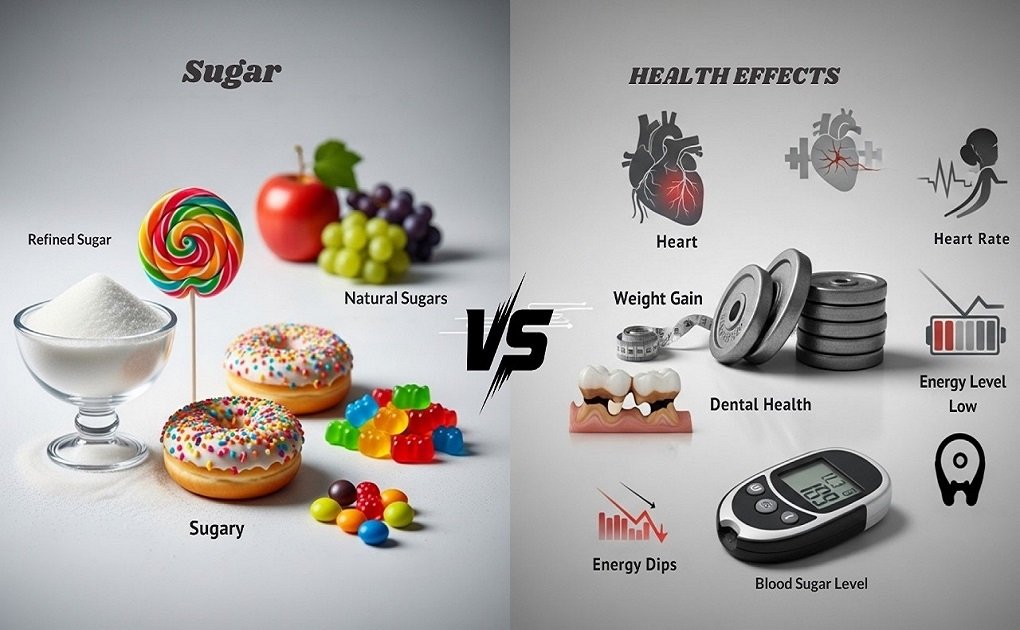The Truth About Sugar: How It Affects Your Body & Mind
- by Usman Nadeem
- 0
- 20

Added sugar can have bad effects on your health if you eat it on regular basis. These changes include weight gain, changes in your mood, energy, stress levels, and cravings. Tooth decay and other health problems can also occur due to sugar.
Carbohydrates can occur naturally or be added, like sugar. Nutrients, fiber, and water are obtained from natural sugar found in whole foods like fruits, vegetables and dairy product. Added sugar is present in sugary drinks, snacks, and breakfast cereals, which add sweetness but provide only empty calories. Simple carbohydrates raise blood sugar levels rapidly, whereas complex carbohydrates-like those in whole grains and beans-help keep blood sugar steady and supply sustained energy.
A number of health problems, including weight gain, acne, type 2 diabetes, and an increased risk of serious illness, are connected to sugar, a common ingredient in many products.
Key Differences Between Natural and Added Sugar:
First, it’s important to know the difference. Different forms of sugar are taken in differently by your body.
Natural Sugar: Found naturally in wholesome, nutritious foods. Consider lactose in dairy products and fructose in fruits. Fiber, vitamins, minerals, and water are all included in these, which slow down absorption and avoid quick blood sugar increases .Natural sugars are sugars that occur naturally in foods like fruits and vegetables.
·
Added Sugar: This is the true problem. These are syrups and sugars that are added to food while it is being prepared. Soda, candies, baked goods, and even “healthy” foods like granola bars and yogurt are common sources of calories. On ingredient labels, look for terms like cane juice, sugarcane nectar, high-fructose corn syrup, and sucrose.
According to the American Heart Association, women should consume no more than 6 teaspoons (25 grams) of added sugar per day, while men should limit themselves to 9 teaspoons (36 grams) per day.
Sugar and its Effects on Physical Health:
Due to sugar, our bodies are significantly impacted with both short-term and long-term effects. Sugar provides a quick energy boost, but it often ends in a crash that leaves you powerless and craving more sugar. Sugar can have a bad impact on mood as it disrupts the “feel-good” hormone serotonin. The long-term effects of sugar, however, are more serious and less noticeable. Here are some reasons why eating too much sugar is bad for your health:

Weight Gain and Obesity:
“Weight gain and obesity are result of empty calories derived from added sugar”
• Type 2 Diabetes: One of the main risk factors for Type 2 diabetes is insulin resistance, which is put on by high-sugar diets.
• Heart Disease: Blood pressure, blood sugar, and cholesterol levels increase as a result of consuming too much sugar, which are risk factors for heart diseases.
• Fatty Liver Disease: Non-alcoholic fatty liver disease can be caused by excessive sugar intake.
• Cancer: Added sugar increases the risk of cancer, weight gain, and increasing insulin levels.
• Energy Changes: Consuming a lot of sugar as a result of feeling weakness and low energy levels and sudden highs in energy levels..
• Skin Conditions: Heavy diets in sugar can cause acne and other skin issues.
• Dental Decay: Sugar promotes the risk of cavities by providing oral bacteria with food source.
• Reduced Cognitive Function: Consuming too much added sugar cognitive decline may result from.
• Weakened Immune System: Heavy diets in sugar can weaken the immune system and reduce the ability to fight infections in the body.
In short, our body has positive effects far from sugar, but the taste is good and makes us feel good quickly. It’s important to keep in mind that not all sugars are harmful. A healthy diet includes natural sugars, such as those in fruits and vegetables. But we should be on to look for added sugars, which are present in sodas, candies, and a lot of junk food.
Sugar and its Effects on Mental Health
Every cell in the body uses glucose, a type of sugar, as its main energy source. The brain uses half of the body’s sugar energy, making it the most powerful organ due to its large number of nerve cells, or neurons.
• Brain Inflammation: Memory and cognitive abilities decrease due to a heavy diet in sugar, which can also lead to brain inflammation.
• Decreased Cognitive Function: Cognitive function, focus, and memory are greatly affected due to too much sugar
• Lower BDNF Levels: Diets heavy in sugar can raise the risk of memory loss and mental illness by lowering brain-derived neurotropic factor (BDNF).
• Mood Swings & Irritability: Mood swings, weakness, and anxiety can result from sugar, as it causes blood glucose levels to rise and fall.
• Anxiety & Depression: High sugar intake can cause mental health problems such as anxiety and depression.
• Dopamine & Addiction: Dopamine levels are increased due to sugar, which can start an endless cycle of addiction.
• Increased Risk of Alzheimer’s and Dementia: Blood vessels are highly effected due to long-term elevated blood sugar levels, increasing the risk of Alzheimer’s and vascular dementia.
• Negative Neuroplasticity: High sugar and high-fat foods can impair impulse control when consumed over time.
Diabetes, a group of diseases in which high blood glucose levels persist over a long amount of time, may have the greatest impact of glucose and other sugars on the brain. In type 1 diabetes, the immune system attacks and kills the pancreatic cells that make insulin, a hormone that the body uses to regulate blood sugar levels. In type 2 diabetes, which is brought on by dietary and environmental factors, cells become resistant to insulin because they are overloaded with it and cannot react properly.
Cut Sugar without Losing Pleasure:
Too much added sugar can badly effect your health in many ways.
Its fine to eat small amounts of sugar now and then, but you should try reduce back on it whenever you can.
Fortunately, just focusing on eating whole, unprocessed foods will automatically lower the amount of sugar in your diet.
Here are some ways to cut down on the added sugars you eat:
-
- Replace sugary beverages like soda, energy drinks, and sweetened teas with water or natural mineral water.
-
- Drink black coffee and use natural sweeteners.
-
- Replace sugar-filled, flavored yogurt with fresh or frozen berries.
-
- Avoid fruit smoothies with added sugar; instead, eat whole fruits.
-
- As an alternative to candy, use a homemade trail mix with dark chocolate chips, nuts, and fruits.
-
- Use vinegar and olive oil instead of sweet salad dressings.
-
- Use no-sugar marinades, ketchup, nut butter, and marinara.
-
- Use products that contain no more than 4 grams of sugar per serving, such as cereals, granola and granola bars.
-
- As an alternative to cereal, use rolled oats with nut butter and fresh berries in the morning.
-
- Use natural nut butter instead of sugary spreads, such as nutella.
-
- Avoid clear of alcoholic drinks that are sweetened with agave, soda, juice, honey, or sugar.
-
- Look around the grocery store for fresh, whole ingredients.
-
- Read food labels to make smart decisions.
-
- Fruits and sparkling water are healthier replacements, choose them.
-
- Cook at home to have control over ingredients.
-
- Watch out for sugar in beverages.
-
- For long-lasting benefits, reduce your sugar intake gradually.
Utilizing a food diary can help you find out where you’re getting sugar from in your diet. Making healthy meals at home and staying away from foods and drinks with a lot of sugar are the best ways to cut down on added sugar.
Why Sugar Matters in a Balanced Diet
Natural sugar can be helpful and necessary in a balanced diet, but only in limited amounts. Women should consume no more than 6 teaspoons of added sugar per day, while men should consume no more than 9 teaspoons, according to American Health Association.
Sugar absorption slows down because of the natural sugars in fruits and vegetables and prevent blood sugar increases while also providing fiber and vital nutrients.
Added sugar can lead to health issues if consumed in excess, as it only provides empty calories. Enjoying a range of foods in the proper amounts is crucial, and a balanced diet offers all the nutrients required without going excessive with sugar.
It’s important to watch out total sugar intake and make sure the majority of the diet consists of nutrient-dense foods when taking in sweets like birthday cakes or soda.
FAQ
1. In what ways does sugar impact the body and brain?
Brain matter and functional connectivity—the connections between brain regions that share functional characteristics—can be affected by increased blood glucose levels. The brain may shrink or weakness as a result.
2. Do humans actually need sugar or not?
Your body can produce the glucose it requires by breaking down food molecules like proteins, fats, and carbohydrates, so you don’t need to add it to your diet. Special sugars are naturally present in foods like milk, fruits, and vegetables. “These are beneficial nutritional additions”.
3. What are the 5 signs you’re eating too much sugar?
Excess sugar craving has weight gain, mood swings, irritability, lack of energy, and anxiety.
4. What impact does sugar have on the brain?
Lowering the amount of brain-derived neurotropic factor (BDNF), which is necessary for learning and the development of new brain cells, destroying cognitive processes like memory and attention, and producing inflammation in parts of the brain like the hippocampus.
5. What happens 14 days without sugar?
If you cut out sugar for 14 days, it includes many benefits like decreased cravings, weight loss, better energy levels, better mental and physical performance, and decreased inflammation.
A Short Review
Excessive amounts of sugar, which are contained in sweetened foods and beverages, can cause weight gain, blood sugar issues, and an increased risk of heart disease. If you reduce added sugar and follow a balanced nutrient diet based on whole foods. Small changes can help break the sugar habit.
Side effects include blood sugar crashes, faster aging, obesity, heart disease, diabetes, and cognitive decline. Consuming added sugar in moderation is likely to have little impact.
If you consult a healthcare advisor for a balanced diet, we can enjoy healthy sweet treats occasionally, which is acceptable. If we can understand the truth about sugar, it is the first step towards.
Finding a balanced diet that works for you is crucial for making informed decisions and choosing healthier alternatives. Making choices that support your health and well-being is key to providing yourself with knowledge.





